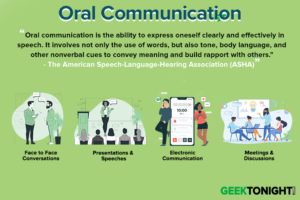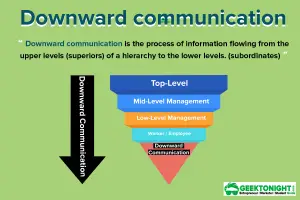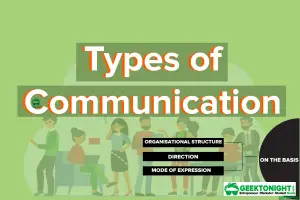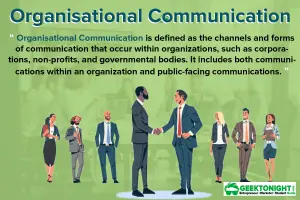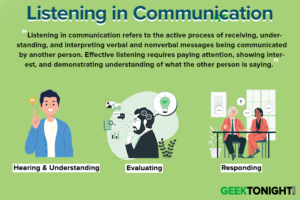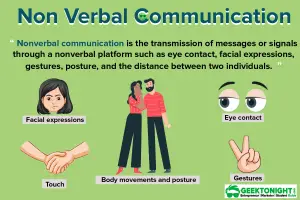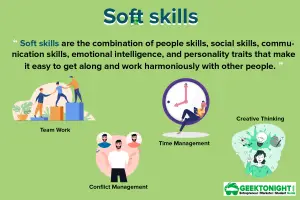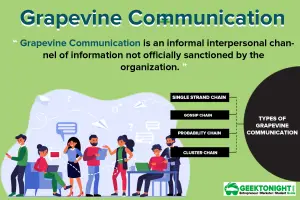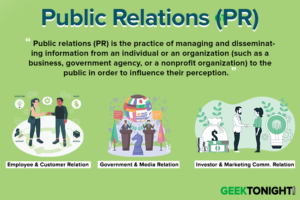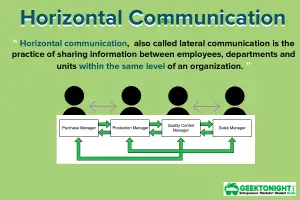What is an Interview?
An interview is a formal discussion between an employer and an applicant, generally in person, for the exchange of information intended to establish the applicant’s suitability for a position. In addition to this, interviews also help employers to identify certain specific traits in the applicants to decide on a candidate suited to the job.
Successful performance by a candidate in the interview ensures final recruitment. Every interview has two parties involved in it. First is an interviewer, who conducts the interview and the other is a candidate, who appears for the interview. As an interview is one of the most important steps in the whole selection process, it should not be taken lightly.
Table of Content
An interview offers an opportunity to the person conducting interview and the candidate (interviewee) to communicate with each other. An interview is a two-way process of communication in which both the employer and the prospective candidate try to evaluate each other.
In the process of selection and recruitment, interviews play a cardinal role. During an interview, the interviewer tries to obtain useful information about the qualities, attitude, career expectations, etc., of the candidate in a systematic manner.
This information is further used to make a decision whether to select the candidate or not. An interview also provides an opportunity to the interviewer to observe non-verbal behaviours of a candidate.
The two main benefits of an interview are as follows:
- It provides an opportunity for employers to decide how well a candidate’s skills align with the organisation’s needs.
- It allows applicants to get acquainted with the prospective employers and decide if the job meets their expectations.
An interview is a chance for an employer to know how a candidate can prove useful for the organisation. It also gives a candidate an opportunity to assess whether his educational qualifications and career aspirations align with the position offered by the organisation.
Some of the objectives served by an interview are as follows:
- To evaluate a candidate’s suitability for the job
- To check an employee’s counselling requirements
- To analyse the capabilities and competencies required for higher positions in case of promotion
- To take the honest feedback of employees on their experience of being associated with the organisation during an exit interview; thereby taking steps towards reducing the attrition rate
- To retain good employees from leaving the organisation by ad- dressing their concerns during an exit interview
Types of Interviews
Every employer has a preferred interview style to obtain information from the aspirants. Some employers use a combination of different interview styles to gauge the different traits of the job applicant.
Some of the common interview styles are as follows:
- Structured interview
- Unstructured interview
- Stress interview
- Behavioural interview
- Problem-solving or case interview
- Group interview
- Walk-in-interview
- Mock interview
Structured interview
This is a formal interview that may have several interviewers and is often referred to as a panel interview. One of the interviewers usually begins the interview with what is known as an ‘icebreaker’ question. This question is meant to relax the candidate before putting forward the more serious questions.
For example, a discussion about the traffic or weather conditions can be used as an icebreaker. This is followed by detail about the organisation and expectations from the candidate, if selected.
Unstructured interview
The unstructured interview is informal in nature where the interviewer is interested in hearing from the candidate and in the process asks a variety of different open-ended questions. These interviews are more conversational and less formal in tone than structured interviews.
The candidate may be asked to share his/her hobbies, or other casual questions designed to put the applicant at ease. Although casual conversations are good and can set a positive tone for the interview, the candidate should ensure that he/she directs the conversation around the desired skills and qualifications.
Stress interview
For positions that see a high level of daily work-related stress such as stockbrokers, and sales and marketing personnel, interviewers prefer this style of interview. The questions asked may remain the same as structured or unstructured interview. The behaviour or demeanour of the interviewer is different so as to create an environment of stress and pressure.
He/she may seem to be preoccupied, conflicting or indifferent to you. The purpose is to evaluate the candidate’s reaction to such behaviour. Candidates should focus on the question and not the manner in which it is asked to be able to answer effectively.
Behavioural interview
This type of interview is a very popular method of a job interview. It is based on the belief that past performance is the best way to judge a person’s future actions. Therefore, interview questions are intended to analyse a candidate’s previous experiences to assess how he/she would behave in similar situations in the future.
This interview is not based on hypothetical situations but on how a candidate would handle a specific situation if challenged to face it in the future. The candidate’s response is a reflection of his/her past experiences (educational, employment, extracurricular, personal) that are assessed to identify behaviours demonstrated in the past.
Problem-solving or case interview
This style of interview assesses a candidate’s analytical ability and communication skills. The candidate is presented with an actual or hypothetical problem to analyse and give solutions for. The candidate may or may not ar- rive at the expected answer.
The interviewer is mainly interested in judging the candidate’s thought process that goes behind responding to the question. An effective answer is one that demonstrates the candidate’s ability to breakdown a case into relevant small information that helps in coming to a conclusion.
Group interview
The purpose of a group interview is to identify how a candidate chooses to distinguish himself from others, how well he performs in a group of individuals who are unfamiliar and whether he possesses the teamwork attributes that the organisation seeks.
Anticipating interview questions and preparing their answers must be done by the candidates. These questions are asked to check various aspects of a candidate such as behavioural, technical knowledge, ability to handle stress, presentation skills and presence of mind while reacting to a given situation. In this type of interview, a number of prospective candidates are interviewed simultaneously.
Walk-in-interview
When an organisation requires employees on an urgent basis, it may conduct walk-in interviews. Candidates have to attend the interviews at the specified place at very brief notice. Those who meet the minimum eligibility criteria are al- lowed to appear for the interview.
Mock interview
For prospective job seekers, sometimes, a dummy interview is organised. This type of interview is pervasive among coaching institutes and business schools. Prior to appearing for the placement interviews, business schools may educate their pupils on how to face the real interviews during campus placements.
Interview Questions
An interview is a type of formal conversation in which an employer evaluates the suitability of a candidate for a particular position in the organisation. The candidate must be prepared to answer the various types of interview questions. The following is a list of some frequently asked interview questions:
- Why have you applied for this position?
- What are your strengths and weaknesses?
- Why have you pursued the MBA programme?
- Which courses did you like best?
- Why should we hire you for this position?
- What are your salary expectations?
- Where do you see yourself after 5 years?
- What do you know about our company?
- How your education will contribute to this job?
- Are you interested in furthering your studies after joining the job?
- What is your biggest professional achievement so far?
- Are you ok with flexible timings?
- Are you comfortable working in shifts?
- What matters to you more—money or job profile?
- Which are the three organisations you wish to work for?
- Would you like to work alone or in a team?
- Are you good at multitasking? If yes, justify.
- What are your long- and short-term career goals?
- What are your views about ethics in an organisation?
- Are you willing to travel 15 days in a month?
Do’s and Don’ts of Interviews
A job interview is an opportunity to convince a potential employer of one’s skills and abilities. Job aspirants should follow some interview practices essential to achieve success in job hunting. These do’s and don’ts are as follows:
Some of the things that should be done in an interview are:
- Dress appropriately. Avoid wearing too fancy clothes or too casual clothes. Look neat and clean and go light with the make-up.
- Reach the venue at least 15 minutes early.
- Practise answers to some expected questions.
- Carry all relevant documents.
- Listen to the questions and answer after giving each question some thought.
- Maintain appropriate eye contact.
- Clear all doubts about the question before answering.
- Exhibit enthusiasm for the organisation and the position.
When facing a panel interview, directly answer to the interviewer who has asked the question while still making brief eye contact with the other interviewers.
Some of the things that should be not be done in an interview are:
- Dress too casually.
- Make disparaging remarks about your previous or current employers.
- Fidget with your hands, pen or hair. However, you may use hand gestures to support your answers.
- Interrupt the interviewer in between his/her question.
- Lie about your abilities or experience.
- Worry or feel anxious in case you don’t know the answer to a question.
- Talk about salary, holidays or bonuses unless specifically discussed by the interviewer.
- Answer questions with a simple ‘yes’ or ‘no’. Explain the answers thoroughly.
Personal Interviews/job Interviews
The purpose of a personal/job interview is to evaluate the candidate who has applied for a post in the organisation. The candidate may be an outsider who has applied for a post in the organisation or an existing employee interviewed for a promotion. In personal/job interviews, the interviewer tries to gain insight into the candidate’s educational background, professional experience, personal aspirations, level of knowledge and areas of excellence.
A personal/job interview is an opportunity for candidates to prove themselves deserving of the position offered and clarify whether or not the job fulfils their own career expectations.
In order to increase their chances of success in an interview, candidates must do the following:
- Background research
- Prepare for questions
- Decent dressing
- Reach on time
- Answering questions
- Post interview
Background research
Candidates must do some homework ahead of appearing for an interview. A good preparation makes them more confident and empowers them to deliver their best. It is important to learn and gather useful information about the organisation’s operation and culture, as it gives them an edge at the time of answering questions.
Candidates must go through the organisation’s website to learn about its history, mode of operation, mission and vision, the number of employees, annual turnover, future projects, goodwill in the industry, products dealt in, major competitors, recent news about the organisation, etc.
Prepare for questions
Ahead of the interview, it is prudent to anticipate probable questions and prepare their answers. If a candidate is well-prepared for questions beforehand, he will be able to handle them deftly. Candidates must practice speaking in front of mirror as it will instil confidence while answering.
Some questions asked frequently by an interviewer are:
- Why do you think you are fit for this job?
- Where do you see yourself in the next five years from now?
- What skill or calibre distinguishes you from others?
- What were the responsibilities of your last position?
- Why are you leaving your current job?
- What do you know about our company?
- Are you willing to relocate?
Decent dressing
Decent dressing is not simply about looking professional, it is also an indication that a candidate recognises the norms and standards that need to be followed. A decent and well-groomed look helps to boost confidence and demonstrates that a candidate is serious about the job, understands the corporate culture and would easily acclimatise to workplace dynamics.
Reach on time
Ideally, a candidate must reach the venue 15 minutes ahead of the scheduled time. This gesture exhibits the punctuality trait. It also gives the candidate time to settle down and gain composure. Reaching the venue in hurry results in hasty decisions and haphazard answers.
Answering questions
While answering the questions of the interviewer, a candidate must speak slowly and coherently. A candidate can take a small pause before responding to a question. A candidate should not be overly loud and maintain an even tone.
Post interview
Towards the end of an interview, the interviewer might provide the candidate an opportunity to ask questions. It is important to make use of this opportunity. By simply saying ‘No Question’ may not create a good impression.
An interviewer might think either the candidate is ill-prepared or not keen for the position/role. It is always advisable to clarify some doubts or apprehensions after the culmination of an interview. A candidate may ask questions such as:
- What would be the further process of selection?
- What kind of initial assignments would I get?
- If selected, would there be a training programme for me?
- Does the organisation promote higher studies for employees?
Preparing for the Interview: Physical and Psychological Aspects
It is considered that the first impression a person creates is pivotal and leaves a lasting imprint on others. A person’s physical demeanour is one of the significant factors on which people base their perceptions. During an interview, candidates only have limited time to create a positive image. A simple way to create a lasting impact in a short span of time is by making sure that they present themselves as appealing professionals.
Even though physical appearance is not the sole criteria to judge a person’s character, it is inherent in human nature to form opinions on what we see or observe. While preparing for an interview, a candidate must consider both physical and psychological aspects.
Various important physical and psychological aspects that a candidate must consider while preparing for an interview are as follows:
Eye contact
A candidate must make eye contact and smile occasionally to show a relaxed, confident and positive attitude. If a candidate fails to maintain eye contact while speaking, it exhibits his lack of confidence. It may also send the subtle indication that the candidate is possibly lying.
Although it is advised to maintain good eye contact throughout the interview, that does not mean to keep staring at the interviewer. A candidate must maintain an appropriate level of eye contact in a natural and friendly manner, which means that there must be brief breaks in eye contact and reconnections.
Grooming
Grooming pertains to physical appearance, which has a great significance when it comes to appearing for an interview. A well-groomed person looks poised, refined and confident, and makes a positive mark on the onlooker’s mind.
Appearance has been regarded as a factor with the greatest power to influence people’s perceptions about others. Everyone lauds a pleasant personality. Since an interview is a formal occasion, the candidate must be formally dressed.
Body language
Body language is a more elusive way of communication as compared to facial expressions or gestures, and ‘hence’ can alter the perception of people. A candidate must maintain a good body posture, sit up straight, and refrain from slouching or hunching.
Hands should be neatly locked in the lap or comfortably placed on the arms of the chair. While being seated, candidates must control unwanted conspicuous leg movements and avoid fidgeting with objects, hands or hair. A candidate’s good sitting posture lends him a dignified look and exudes confidence.
Build rapport
A candidate must try to build rapport with the interviewing person. Building rapport begins the moment a candidate enters the room. Let the interviewer set the tone. It would be awkward if the candidate first makes a handshake gesture that is not returned by the interviewer.
Therefore, a candidate should wait for the interviewer to offer his/her hand first and then respond immediately. Some experts advice to talk at the same pitch and tone as that of the interviewer.
Facial expression
A candidate’s facial expression conveys a lot about his emotions. A candidate should keep a smile on his face as it indicates that he is receptive and in good mood. A decent smile even makes the interviewer comfortable. Smiling at the beginning and culmination of the interview, but having a slightly serious look during an interview, leaves a good impression on the interviewer.
Business Communication Notes
(Click on Topic to Read)
- What is Business Communication?
- What is Communication?
- Types of Communication
- 7 C of Communication
- Barriers To Business Communication
- Oral Communication
- Types Of Non Verbal Communication
- What is Written Communication?
- What are Soft Skills?
- Interpersonal vs Intrapersonal communication
- Barriers to Communication
- Importance of Communication Skills
- Listening in Communication
- Causes of Miscommunication
- What is Johari Window?
- What is Presentation?
- Communication Styles
- Channels of Communication
- Hofstede’s Dimensions of Cultural Differences and Benett’s Stages of Intercultural Sensitivity
- Organisational Communication
- Horizontal Communication
- Grapevine Communication
- Downward Communication
- Verbal Communication Skills
- Upward Communication
- Flow of Communication
- What is Emotional Intelligence?
- What is Public Speaking?
- Upward vs Downward Communication
- Internal vs External Communication
- What is Group Discussion?
- What is Interview?
- What is Negotiation?
- What is Digital Communication?
- What is Letter Writing?
- Resume and Covering Letter
- What is Report Writing?
- What is Business Meeting?
- What is Public Relations?
Business Communication Notes
(Click on Topic to Read)
- What is Business Communication?
- What is Communication?
- Types of Communication
- 7 C of Communication
- Barriers To Business Communication
- Oral Communication
- Types Of Non Verbal Communication
- What is Written Communication?
- What are Soft Skills?
- Interpersonal vs Intrapersonal communication
- Barriers to Communication
- Importance of Communication Skills
- Listening in Communication
- Causes of Miscommunication
- What is Johari Window?
- What is Presentation?
- Communication Styles
- Channels of Communication
- Hofstede’s Dimensions of Cultural Differences and Benett’s Stages of Intercultural Sensitivity
- Organisational Communication
- Horizontal Communication
- Grapevine Communication
- Downward Communication
- Verbal Communication Skills
- Upward Communication
- Flow of Communication
- What is Emotional Intelligence?
- What is Public Speaking?
- Upward vs Downward Communication
- Internal vs External Communication
- What is Group Discussion?
- What is Interview?
- What is Negotiation?
- What is Digital Communication?
- What is Letter Writing?
- Resume and Covering Letter
- What is Report Writing?
- What is Business Meeting?
- What is Public Relations?


